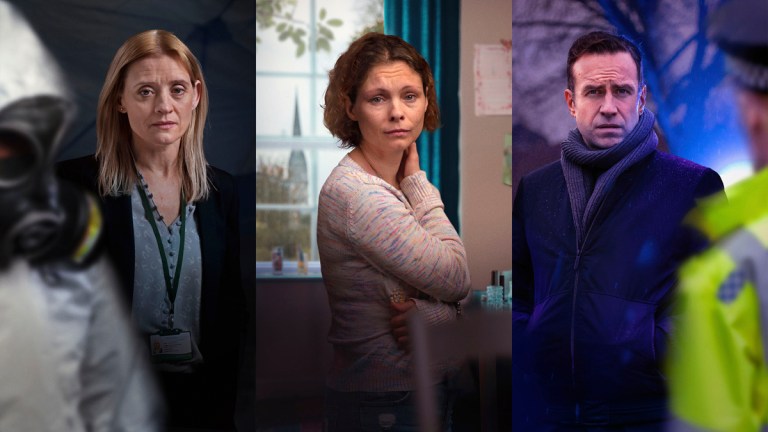The Salisbury Poisonings Review: Extraordinary Real Life Novichok Drama
New three-part BBC One drama The Salisbury Poisonings shows the emotional impact on locals unexpectedly affected by an international spy assassination attempt…

“Have you ever done anything like this before?” public health director Tracy Daszkiewicz is asked in episode one of The Salisbury Poisonings. “I’ll tell you when I know what it is we’re doing,” she answers. That unassuming, honest wit and humility becomes characteristic of her approach across this extraordinary drama.
2020 may feel as if it has the monopoly on the word ‘unprecedented’, but in March 2018, Daszkiewicz and her colleagues faced a singular crisis: an international assassination attempt using a lethal, invisible and almost impossible-to-detect substance, a teaspoonful of which could kill tens of thousands of people. And all this in the picture postcard city of Salisbury, a place of river walks and lardy cake, not the expected backdrop to a global spy conspiracy.
At the time of the attack on Sergei and Yulia Skripal, the vital role Daszkiewicz played in protecting the people of Salisbury went undersung. Press focus at the time was, understandably, on the case’s emerging, grotesque details. Front pages tracked the Skripals’ movements leading up to their town centre collapse, the perfume bottle later detected as a source of nerve agent Novichok, the suspects’ contemptuous denial of their involvement in a now-infamous Russian television interview… The work of the public servants keeping the city safe, and the human cost of this extraordinary chapter in English history didn’t make the headlines.
BBC One’s The Salisbury Poisonings is here to correct that. Written by Panorama journalist Declan Lawn and Adam Patterson, and directed by former documentary-turned-feature filmmaker Saul Dibb, the drama is a tribute to the community that found itself unexpectedly at the centre of this tragedy. It’s an acknowledgement of the keen instincts and robust work of Tracy Daszkiewicz and her teams, and a voice for the families of the attack’s unintended victims Nick Bailey and Dawn Sturgess.
It’s also, inadvertently, an acutely relevant distillation of our present global health crisis. When filming began in Bristol and Wiltshire in 2019, the word ‘Coronavirus’ meant as little to the public as the word ‘Novichok’ did prior to the Salisbury attack. Airing in the summer of 2020, the drama’s focus on contamination, PPE, threats to public health vs local economy, relatives unable to attend the bedsides of stricken loved ones, and public sector sacrifice is made strikingly timely. This compassionate three-parter could double up as the first Coronavirus drama.
Anne-Marie Duff plays Daszkiewicz, the Wiltshire official landed with an inconceivable task. On the 5th of March 2018, two Salisbury residents – a resettled Russian convicted of spying for England, and his daughter – collapsed in the streets after being poisoned with a lethal, highly potent and transferable nerve agent. Daszkiewicz designed a response to the threat that, as police superintendent Dave Minty (Darren Boyd) tells her, saved the lives of thousands.
The Salisbury Poisonings steadily records the measures taken. Areas of the city are cordoned off with metal fencing. Vehicles are wrapped in plastic and hoisted away by forklifts. Hazmat-suited investigators swab the tables at an evacuated branch of Zizzi. The collision of banality and sci-fi strangeness takes us right back to the contemporary news reports, many of which are included as real archive footage is spliced with the reconstruction (out of sensitivity for Salisbury residents and marking the recentness of the event, any hazmat scenes were filmed in cover locations).
The real eye though, isn’t on public action, but private impact. To describe the weight of personal toll taken, first The Salisbury Poisonings establishes the day-to-day love and humanity of its central trio. We’re shown the warmth between Daszkiewicz and her youngest son, as well as the gentle support of her husband. We meet DS Nick Bailey (Rafe Spall), his wife Sarah (Annabel Scholey) and their children, witnessing their affection and easy bond. We’re shown the love between Dawn Sturgess (MyAnna Buring) and her young daughter. This isn’t a workplace-only lanyard drama. Domestic scenes are used to measure the emotional impact of what comes to pass.
What comes to pass is, at times, agonising to watch. The grief of Dawn Sturgess’ family, made more severe by tabloid intrusion and insults printed about her life, is laid bare. Tracy Daszkiewicz’s self-doubt buckling her under the weight of responsibility is conveyed with naturalism by Duff, the star of the show. Through expressive hallucination sequences, we’re taken inside Nick Bailey’s poisoning to feel his burning and disorientation, and later shown the longer-term effects of his guilt and trauma.
‘Longer-term effects’ not ‘long-term’, because the paint still hasn’t dried on these events, despite them having fallen out of the news cycle. That’s one reason to revisit them so soon afterwards – to reshape the narratives told and untold around these events while they’re still mouldable in the public memory.
The Salisbury Poisonings has a timely message to spread about human resilience in the face of the unknown and unimaginable. It’s not here to cash in on a salacious spy tale, but to remind us not to take our unseen protectors for granted, and in part, to reassure us that after catastrophe, comes recovery.
The Salisbury Poisonings airs at 9pm on BBC One on Sunday the 14th, Monday the 15th and Tuesday the 16th of June.

